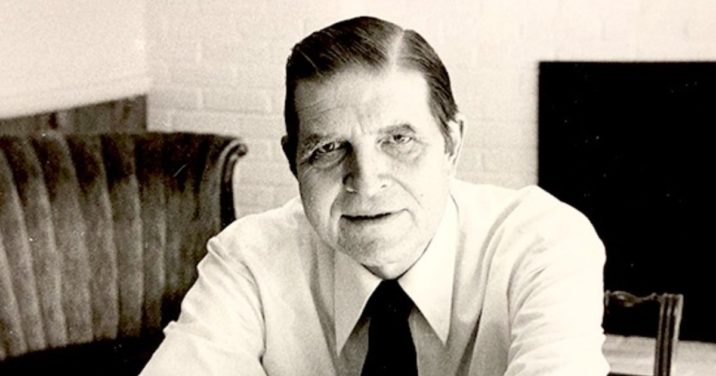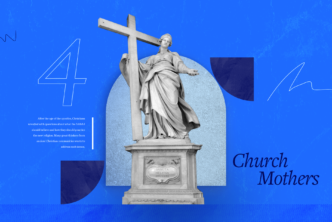Carl F. H. Henry (1913–2003) was born as a son to German immigrants in New York City. Henry was raised in a nominal Christian home, his mother a nominal Roman Catholic and his father a nominal Lutheran. He was converted to the knowledge of and faith in Jesus Christ as a young man. During the Great Depression, after high school at age nineteen, due to his rapid typing abilities, he began work as an editor for a weekly New York newspaper in Suffolk county. He went on to complete his bachelor’s and master’s degrees at Wheaton College. Continuing his studies, he completed a ThD from Northern Baptist Theological Seminary in 1941 and later a PhD in Philosophy from Boston University in 1949.1
He has been nicknamed the “thinking man’s Billy Graham” and has had extraordinary influence in the very formation of evangelicalism, post-WWII and onward, for over fifty years of active ministry. Henry is recognized by many throughout modern evangelicalism as “a theologian who was responsible for the revival of American evangelicalism in the 1940s and 1950s.”2
Henry served as one of the founding faculty members of Fuller Theological Seminary. Fuller stood at its outset as the flagship seminary in a national movement to bring a reformation to fundamentalism in America and beyond. He served as president to the Evangelical Theological Society, the American Theological Society, and was central in influence to the formation of the Berlin (1966) and Lausanne (1974) World Conferences on Evangelism. Additionally, he was the founding editor of Christianity Today magazine, and served as professor of Theology at both Eastern Baptist Seminary (1969–74) and Trinity Evangelical Divinity School (1971). Henry also served as a lecturer for World Vision International (1974–87) and was a board member for Prison Fellowship Ministries beginning in 1990.
It would be no exaggeration to describe Henry as an intellectual giant in modern Christian history, and his influence continues to be recognized from his lion’s share of influence throughout American evangelicalism and all over the international Christian landscape. Author of over forty books, he is partly remembered for his “paradigm shifting” book, The Uneasy Conscience of American Fundamentalism that became known as a neo-evangelical manifesto. Other greatly influential works of Henry include his magnum opus, the six-volume God, Revelation and Authority (1976–83), Confessions of a Theologian: An Autobiography (1986), and Twilight of a Great Civilization (1988).
The worldview of Carl F. H. Henry
Carl Henry’s worldview was shaped dramatically following his Christian conversion as a young man. Through his extensive educational and spiritual formation beginning at Wheaton College, he gradually surfaced as a dominant voice in American Christianity. Various corners of Christian theological education and ecclesiastical life were most significantly touched by the life of Henry. Though he was an ordained gospel preacher, his niche was in the realm of theological education where he specifically influenced the direction of philosophy, ethics, theology, and missions in general. However, his influence certainly reached other areas to include apologetics, evangelism, and sociology.
Much of the legacy of Henry is observed in the themes that he championed for the defense of the veracity and trustworthiness of the Bible. There are conceivably many pieces that could characterize the worldview of Henry, but here three will be considered.
1. A Bible-centered theologian/philosopher
As a Bible-centered theologian/philosopher, Henry believed the Holy Bible to be the absolute ground of truth. He desired to be known for this reality, as is evident in God, Revelation and Authority (GRA), which may be described as a treatise for the defense of the authoritative truth of Scripture. In the first sentence, first chapter, first volume, The Crisis of Truth and Word, he writes prophetically in 1976, “No fact of contemporary Western life is more evident than the growing distrust of final truth and its implacable questioning of any sure word.”3 Henry writes with great conviction of all theological and philosophical themes with extraordinary depth. He tackled issues of science, epistemology, ethics, morality, and all societal trends that opposed the ways of God in Scripture.
Henry in many presuppositional ways argues against ideologies such as the neo-orthodoxy of Barth, the Agnostic-Pelagian notions of Kant, and the Metaphysical Philosophy of Aquinas. From the first volume of GRA, entitled Theology and Philosophy, he tightly concludes that, “Christian theism resists the intrusion of speculative principles into the constitutive meaning of revelational truth.”4
2. A pastorally minded apologist/evangelist
As a pastorally minded apologist/evangelist, Henry was not merely a maverick, zealous about winning logically reasoned philosophical arguments against God. He had a refined pastoral instinct and a love for the church of Jesus Christ, including the foreign missionary endeavor. Certainly, he had a captivated motivation towards work of the Christian gospel and was ordained to the Christian ministry in the Northern Baptist Convention in 1941. Henry writes with a balance of microcosmic and macrocosmic applications of the Christian faith to life. In the book Christian Countermoves in a Decadent Culture is seen Henry in standard form, and certainly what may sync with the gospel-centered emphasis of current Reformation-minded evangelicalism. He writes in a chapter on the modern importance of the resurrection, “The Bible has as its climax the person of Jesus Christ- the centrality of His incarnation, crucifixion, and resurrection as the promised Messiah, who took on himself our human nature, lived a perfect life, died and atoning death, and rose in triumph over the tomb.”5
In another work of a characteristic flavor, The Christian Mindset in a Secular Society, Henry exhorts American evangelicals specifically about the responsibility of personal evangelism in daily life. He urges, “Is it not high time for those who expect to be counted truly as Christians to speak to neighbors and townspeople about Christ? How many would fail the test, and how often, if in each Sunday service those were asked to stand who during the past week had witnessed to one person about Jesus Christ?”6
His writings demonstrate much that, though he engaged robustly in philosophical defenses against ungodly ideologies, he maintained a humble perspective about living out the Christian faith in a genuine way of concern for the lost.
3. An American patriot
An American patriot, Henry desired to see his country come to trust in the biblical worldview that many of its founding fathers held. Woven into the worldview persona of Henry was a true American patriot who longed for the wide sweeping cultural change through conversion of the citizens of our nation to Christ. Earlier to later speeches and writings show his zeal for profound gospel-driven influence towards national repentance and transformation. His early comments resonate in a prophetic way when one considers the ethical and theological trajectory that modern American culture has migrated towards. In a 1953 speech he stated, “America, how far you have fallen from the dream of the founding fathers, how dreadfully you have drifted from their Christian philosophy of history, how far short you have stepped from the lofty spiritual objectives which they projected for this land.”7
Again, his burden for the spiritual well-being of all Americans is seen in a representative fashion in a 1952 address. He remarked,
The healing of a nation’s diseases comes not alone from political-economic programs or from a new administrative leadership: it comes from spiritual regeneration and moral renewal. The breakdown of morality and of spirituality in America calls the citizenry from false and changing gods to the living God, and the living God calls us to repentance.8
In a 1957 article for Christianity Today, Henry demonstrates that his large-heartedness and deeply felt conviction for the spiritual well-being of the nation had not waned. He wrote,
The theme of human freedom throbbed blood-fresh in the veins of America’s Founding Fathers. Alongside the titanic brutalities of our own time, the tyranny they deplored was perhaps only the shadow of sorrow. Nevertheless, they appealed to the one eternal Preserver of man’s responsible existence, the almighty Guardian of the dignity of man, and Definer of the powers of the state.9
Thus, Henry seemed to sense a national-level burden for the souls of Americans at the heart of his faith and worldview of life. He wrote for the Christian pastor and layperson in churches throughout the country and beyond. He showed this pastoral-evangelistic burden as well for leadership in the “unprecedented World Congress on Evangelism”10 in 1966, where evangelistically minded gospel-workers gathered from over a hundred nations.
At the 1966 World Congress, Henry called for the need for “theologian-evangelists and evangelist-theologians.” He purposefully declared that God was indeed a God of both “justice and of justification.”11 Henry was also instrumental in the leadership of the 1974 Lausanne 1: The International Congress on World Evangelization. This again demonstrates Henry was at heart greatly concerned with the advancement of the authentic gospel of Jesus Christ.
Perspectives on Ethical Theory
For clarification, in many ways, this is not a separate point or place in the life of Henry, as he was a man of well-synthesized thought and character. The formative work by Henry on ethical theory is a comprehensive tome, entitled Christian Personal Ethics. The work is a representation of Henry’s teaching life and perspective on all things ethics. He was both a philosophy and theology professor, and the book covers both. He proves that the Christian thinker can engage in the conversation of all forms of traditional “speculative philosophy” and yet as a Bible-believing supernaturalist have a genuine place at the scholastic table of philosophy.
The book represents his grasp of how the history of speculative philosophy has abandoned its opportunity to impact the world with moral and ethical betterment. In the first half of the Christian Personal Ethics, he offers an engagement in the study of naturalistic, idealistic, and existentialist ethics. Yet, he states his conclusions early in the book that the ethics writers have failed to sufficiently articulate “Hebrew–Christian morality.” He concludes that “the impotence and sterility of speculative ethics derive largely from its self-enforced segregation from the ethics of revelation; Christian ethics becomes impoverished when unrelated to the problems of secular morality to which the man of the world seeks an answer.”12 One can see this conviction also compelling other writings of Henry that beckon the evangelical church to social action that should exist in the moral convictions of their heart as an ethical outworking of their Christian faith.
Henry sifts every type of ethical ideology and in the end offers a biblical corrective to the thinking of the given ethical view. A couple examples are the utilitarianism of John Stuart Mill, and the existentialism of Friedrich Nietzsche, which demonstrate the approach of Henry. Firstly, in the pleasure-centered utilitarianism of Mill, Henry writes with strident clarification, “Disparaging the disjunction of pleasure from righteousness in the search for well-being or happiness, the Scriptures speak of those who are ‘lovers of pleasure more that lovers of God [cf. 2 Tim 3:4].’”13 This depicts the clear way Henry taught that the Christian ethicist must refute unbiblical ethical theories.
Secondly, in the other example stated, Nietzsche and his existential ethics are confronted by Henry with biblical ethical teaching. Henry notes well that Nietzsche agrees much with Darwin, yet distinguishes the Darwinian-evolutionary “struggle for existence” from his own belief that man really faces a “struggle for might” or power.14 In light of this philosophy of Nietzsche of a worldwide struggle for power, Henry explains,
Nietzsche declares that Christian moral ideals have brought about a weak and dwarfed Europe, a morality of pity which is “the most sinister symptom of our modern European Civilization.” But past history discloses that where the will to power and not Christianity (the will to holy love) has shaped the world’s ideals, this worship of power has thrown nations into disorder and decay, and even today threatens to bankrupt civilization.15
Henry does well to not only engage atheistic and unbiblical ethical ideologies, he also sharply draws true historical examples to illustrate the ethical impoverishment of their theories.
***
Further resources
Architect of Evangelicalism: The Essential Essays of Carl F. H. Henry
Regular price: $16.99
Basics of the Faith: An Evangelical Introduction to Christian Doctrine
Regular price: $19.99
***
Bibliography
- D. A. Carson, “The Complete Christian: The Massive Vision of Carl F. H. Henry,” TrinJ 35nS (2014): 17–18. “Carl Henry was one of a most remarkable group of young evangelicals who pursued doctoral studies at Harvard and Boston Universities at the same time. The group included John Gerstner, Roger Nicole, Samuel Schultz, Harold Kuhn, Harold Greenlee, George Turner, Paul Jewett, Edward Camell, George Ladd, Stanley Horton, Lemoyne Lewis, Kenneth Kantzer, and others. Yet in some ways, Carl Henry was the leader of this “club.” Kantzer has written: “Carl did not know as much Old Testament as Sam Schultz, who was completing his work in Old Testament under Charles Pfeiffer. He did not know as much New Testament as Harold Greenlee and George Ladd, both studying under Henry Joel Cadbury. He did not know as much of the history of doctrine as did Paul Jewett and I. And he did not know as much philosophy as Harold Kuhn, who was assistant to Arthur Darby Nock, chairman of the department. But on all crucial points, he knew enough to argue intelligently toe to toe with any of us. In short, he already had the makings of a first-rate evangelical theologian leaning toward philosophy of religion. No evangelical theologian who bases his or her understanding on the norm of Scripture and seeks to communicate that faith effectively to the world of scholarship around us can ignore any of these fields. Not least, Carl Henry knew what was going on in the world … Carl, moreover, was never afraid of new ideas … His emphasis was always on the big picture. Above all he sought to think clearly and effectively, consistently and comprehensively about the total Christian world and life view. From the very first he exhibited an impassioned desire to serve God with the mind. This combination of concerns, in my judgment, is the key to Carl’s life and ministry.”
- Timothy George, “On Carl F. H. Henry’s Legacy,” The Way of Improvement Leads Home (January 24, 2013), https://thewayofimprovement.com/2013/01/24/timothy-george-on-carl-f-h-henrys-legacy/.
- Carl F. H. Henry, God, Revelation and Authority, Vol. 1 (Waco, TX: Word Books, 1976), 17.
- Ibid., 201
- Carl F. H. Henry, Christian Countermoves in a Decadent Culture (Portland, OR: Multnomah Press, 1986), 100.
- Carl F. H. Henry, The Christian Mindset in a Secular Society: Promoting Evangelical Renewal & National Righteousness (Portland, OR: Multnomah Press, 1986), 51.
- Carl Henry, quoted in Timothy Padget, “Carl Henry: The Principled Patriot?” TrinJ 35nS (2014): 97.
- Ibid., 98.
- Ibid., 102.
- Carl F. H. Henry, Confessions of a Theologian: An Autobiography (Waco, TX: Word Books, 1986), 252.
- Ibid., 257.
- Carl F. H. Henry, Christian Personal Ethics (Grand Rapids, MI: Eerdmans, 1957), 16.
- Ibid., 41–42.
- Ibid., 61.
- Ibid., 65.







